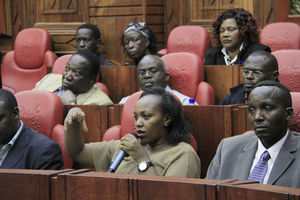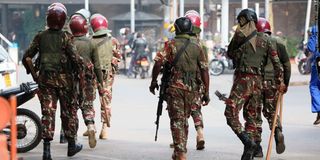
Anti-riot police officers walk along Kenyatta Avenue in Nairobi during protests on June 12, 2025.
You could be fined Sh100,000 or be sent to prison for three months if found guilty of participating in a demonstration at a non-designated area if MPs pass a Bill currently in the House.
The Public Order (Amendment) Bill, 2025 which is sponsored by Nairobi Woman Representative, Esther Passaris, seeks to exclude three areas from demonstrations and picketing.
If passed, Kenyans will not be allowed to picket 100 metres from Parliament, protected areas and a building hosting a court.
The Bill, which is being examined by the Committee on National Security and Administration, seeks to amend the Public Order Act by empowering the Interior Cabinet Secretary – in consultation with county governments – to designate demonstration zones in cities and other urban centres.
If the demonstrators have a petition, then must wait for their leaders at that point to pick it for transmission to Parliament, the Bill says.
“A person who contravenes the provisions of this section commits an offence and shall, on conviction, be liable to a fine not exceeding Sh100,000 or to imprisonment for a term not exceeding three months or both,” it reads.
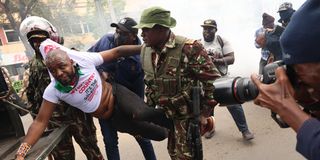
The Bill is being scrutinised by the Narok West MP Gabriel Tongoyo-led committee, which has the powers to accept the proposed changes and take the views of other agencies before doing a report to the House for consideration during the second reading.
On Tuesday, the committee said it has written to the Attorney-General and the Kenya Law Reforms Commission to present their views on the Bill.
Appearing before the team yesterday, Ms Passaris said the changes are not meant to curtail the freedom of protesters but to bring order and sanity during demonstrations.
Criminalise protests
“This law is not meant to criminalise protests, it is not meant to silence anyone but to bring order and protect people,” the Nairobi Woman Representative said.
“It is meant to ensure protests are not hijacked by goons. Order is not an infringement of democracy. The changes are meant to create safe spaces for demonstrators and other people not taking part in the marches.”
She added that the categorisation is meant to shield State House, Parliament, police stations, courts and other protected areas from demonstrators.
“Police stations house criminals. What happens if they are stormed?” Ms Passaris asked.
“Supermarkets were looted during recent demonstrations yet they create jobs. Such people are criminals but they can access the supermarkets. That is why we need to designate certain places for demonstrations.”
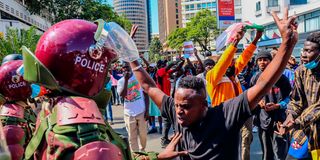
A police officer engages with protesters demonstrating along Kenyatta Avenue in Nairobi during anti-Finance Bill demos on June 25, 2024.
Even before being presented to the House for debate, the Bill already created divisions in the committee, with some members expressing reservations, saying it may not be practically possible to implement it.
Nyakach MP, Aduma Awuor, cautioned his colleagues against acting on impulse and emotions when considering the Bill, adding that there is need for sobriety.
“Amending the Public Order Act will not change the situation the country finds itself in. We must address the realities being raised by these people,” Mr Awuor said.
“We need to think of these things deeply. There is already a law for looters and thieves.”
He demanded to be informed how, for instance, people will assemble in one place in the City Centre when it can accessed from different areas.
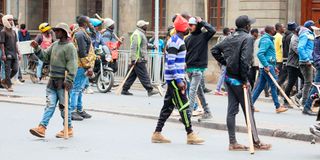
Goons on Moi Avenue in Nairobi on June 17, 2025 during protests following the death of Kenyan blogger Albert Ojwang.
“People can access the Central Business District using many routes. How will we enforce this law? Let us be practical,” Mr Awuor said.
Kisumu West MP, Rosa Buyu, also questioned the rationale of designating one area for demonstrations.
“People picket to express their displeasure about something. When we designate an area with no people, would we therefore be curtailing their freedom to be heard? What will they have achieved with the demonstrations?” Ms Buyu asked.
Designated area
The Kisumu West lawmaker added that mobilising for demonstrations today is different from what used to happen in the past, “meaning it will be difficult to ensure protesters assembly in a designated area”.
“Mobilising for protests has become amorphous. How will the organisers notify police? How will they assemble in one place?” she asked.
Mr Bobby Mkangi, a constitutional lawyer, said the Bill violates Article 37 of the Constitution as it seeks to limit the freedom of picketing.
“The philosophy and nature of a protest is that it has to disturb normalcy in order to draw the attention of the people in authority to address the issues being raised,” Mr Mkangi told the Daily Nation.
“In some situations that I want to picket against the presidency, I can only do so effectively near Harambee House on Harambee Avenue. Why would you take me to Uhuru Park?”
Mr Tongoyo, however, said the country is at a crossroads and there is need to balance the right to picket and maintaining law and order.
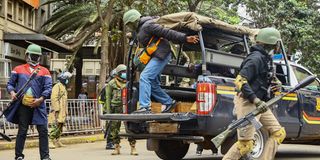
“We must have learnt lessons. We also need to sanitise the space so that we don’t infringe on the rights of the people. We should strike a balance,” the Narok West MP said.
Mandera East MP, Abdirahman Mohamed, said the Bill is an idea whose time has come and should be passed fast.
“The future does not look safe. If these people go to Parliament, courts, State House and police stations where they even take guns, what happens next?” Mr Mohamed asked.
He said complaints by the people would still be heard even if they hold demonstrations at designated points, adding that they do not need to be going to the City Centre.
“Even if they go to Uhuru Park, journalists will be there. They will still be covered and will be heard in the 290 constituencies. What else do you want?” the MP asked.
Sotik MP Francis Sigei, who supports the Bill, said it is not easy to attain a balance of peace, justice and the rule of law.
“As a peace-loving people, we must support these amendments. What happened last week (during the demonstrations) has been condemned. The rule of law must be respected,” the lawmaker added.
There were chaotic scenes in the National Assembly as the House considered the security laws, deemed in many quarters as authoritarian, in 2014.
During the session, then-Jubilee ruling coalition pushed through controversial amendments to the security-related Bill, with then-Speaker Justin Muturi in the driving seat.
Despite uproar from the opposition, Jubilee lawmakers and parliamentary orderlies took charge of the situation as the House passed controversial provisions such as punishment of media organisations for printing materials that the government said were likely to cause fear or alarm.

Protesters picket along Kimathi Street in Nairobi on June 25th 2025 during the commemoration of the 2024 Gen-Z protests.
If MPs proceed with the proposed amendments in their current form, it is likely to cause uproar from the public.
The Bill will likely be interpreted as a means of curtailing the freedom of Kenyans to hold demonstrations.
Assembling, demonstrations and picketing are governed by Article 37 of the Constitution and the Public Order Act.
Public meeting
Section 5 of the Act requires any person intending to convene a public meeting or procession to notify the regulating officer of such intent at least three days but not more than 14 days before the proposed date.
One of the matters to be included in the notice is the proposed site of the public meeting or the proposed route in the case of a procession.
The Parliamentary Powers and Privileges Act Section 8 empower the Speaker to designate areas proximate to the precincts of Parliament where the public may assemble, demonstrate, picket or present memoranda to the MPs, pursuant to Article 37 of the Constitution.
The Act also says that any assembling, demonstration, picketing and presentation of memoranda to the National Assembly or Senate must be in accordance with such guidelines as the Speaker may issue.
In South Africa, demonstrations are governed by the Constitution and the Regulation of Gatherings Act (No. 205 of 1993).
Section 17 of the South African Constitution provides that everyone has the right – peacefully and unarmed – to assemble, demonstrate, picket and present petitions but prohibits demonstrations and gatherings in the vicinity of courts, premises of Parliament and Union buildings, except with special permission.
In Nigeria, the Public Order Act empowers the governor of a state to direct the conduct of assemblies, meetings and processions on public roads or places of public resort and to prescribe the route and the times of a procession.
Applications for assemblies and processions must, however, be made to the governor with a notice period of 48 hours.
Assemblies and demonstrations are governed by the Public Order Act 1986 in the United Kingdom.
Part II of the Act relates to processions and assemblies, which require any person intending to hold a public procession to give a written notice.
That notice must specify the intended date of the procession, the starting time, the proposed route and the name and address of the person – or of one of the persons – proposing to organise it.
If the senior police officer – having regard to the time or place at which, and the circumstances in which a public procession is being held or is intended to be held and to its route or proposed route – reasonably believes that it may result in public disorder, damage to property or disruption to the life of the community, he may give directions imposing on organisers or taking part in the procession such conditions as appear to him necessary to prevent such disorder, damage and disruption.

